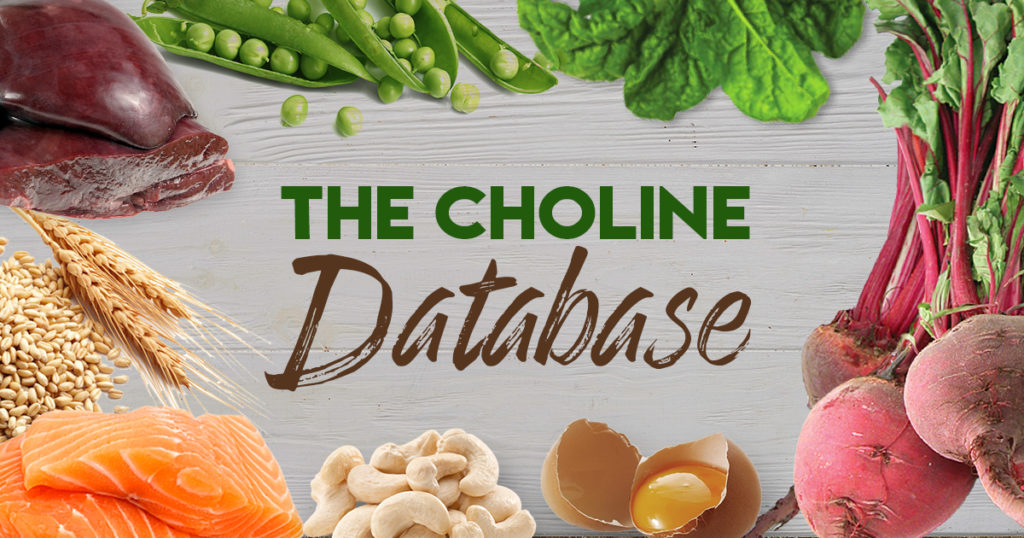
Read below for how to use the database and how much choline you should get, or just start searching now!
How to Use the Database
This database allows you to search for specific foods, or to do a blank search to list all the foods in the database in declining order of choline content. You can change the category from “all foods” to one of the other choices and do a blank search to rank all the foods within that category.
If you search for specific foods, it is best to search for a single keyword, as the database tends to get tripped up with phrases.
By default, the database gives you the results as “total egg yolk equivalents.” This takes the amount of choline in the food, plus the amount of a related molecule known as betaine, and expresses them as the number of 20-gram large egg yolks you would have to eat to get the same amount of choline.
I recommend getting up to half your choline requirement as betaine, but not more than that. To separate out the betaine from the choline, you can choose to rank the foods by “egg yolk choline equivalents” or “egg yolk betaine equivalents.”
You can also choose to rank the foods by the amount of choline or betaine in 100 grams, or by specific subtypes of choline.
Finally, you can rank the foods by the percentage of their choline present as glycerophosphocholine, the form that best supports muscular strength, learning, memory, and focused attention; or the percentage as phosphatidylcholine, the form that best prevents fatty liver disease and supports gall bladder health and fat digestion.
No matter how you choose to rank the foods, you can click on “view more details” under each food in the search results to see all of the choline-related data for that food, and where the data came from.
How Much Choline Do You Need?
You can see the official recommendations here.
I recommend all adults shoot for at least 550 milligrams per day (mg/d), which is the equivalent of four egg yolks.
People with low MTHFR activity should consume 900-1200 mg/d, which is the amount in seven to nine egg yolks.
If you don't know your MTHFR status, you can ask your doctor to do a test, or you can get a 23andMe or Ancestry analysis of your genome and submit it to a third-party app that will give you a report on your methylation genetics. If you choose the latter route, I recommend using StrateGene, created by Dr. Ben Lynch. If you use this link I will earn a small commission at no extra cost to you, and that will help support the free work I put out, such as this database.
For children, I recommend taking the adult target, dividing it by 2, and getting that number for every 1000 Calories the child eats on average.
What Are the Best Forms of Choline?
What form you emphasize should depend on your goals:
- Phosphatidylcholine is best for preventing or reversing fatty liver disease, supporting gall bladder health, and supporting fat digestion. Phosphatidylcholine is also least likely to generate TMAO. This is a compound that gut microbes make from choline that you don't absorb, and some researchers believe it contributes to heart disease (see below).
- Glycerophosphocholine is best for supporting muscular strength, learning, memory, and sustained, focused attention.
- Betaine (trimethylglycine) is best for supporting methylation, which supports many aspects of your mental and physical health. For more on methylation, see this primer.
What Are the Best Choline-Rich Foods?
Your basic choline requirement is four egg yolk equivalents, and with low MTHFR activity you should add an additional 3-5 egg yolk equivalents.
In the following list, the meat is measured before cooking, while the nuts, seeds, and flours are measured after drying or roasting.
The following foods primarily provide choline. You can mix-and-match any of these foods to satisfy your entire requirement. Each of these is equal to one, large, 20-gram egg yolk:
- One egg yolk
- One tablespoon of lecithin (lecithin hasn't been added to the database yet, but will be soon)
- 40 grams of (g) beef liver, measured before cooking
- 44 g veal liver
- 62 g turkey liver
- 71 g chicken liver
- 143 g salmon
- 135-285 grams of most meat, fish, or shellfish
- 172 g flax seeds
- 185 g pistachios, quinoa, amaranth, or pinto beans
- 215 g pumpkin or squash seeds, or cashews
- 250 g pine nuts, edamame, buckwheat, sunflower seeds, peanuts, or almonds
The following foods primarily provide betaine. You can mix-and-match any of them to satisfy up to half of your requirement:
- 24 g quinoa
- 25 g wheat germ
- 37 g wheat bran
- 44 g raw lambsquarters
- 57 g canned beets
- 83 g dark rye flour
- 105 g frozen spinach
- 112 g raw beets
- 140 g whole wheat flour
- 143 g raw kamut
What Are the Best Choline Supplements?
When seeking a choline supplement, there are several issues to consider:
- Some supplements may list the amount of choline in a product, while others list the amount of the molecule that contains the choline, and this can lead to confusion about the dose.
- Some forms of choline are better for some purposes than others.
- Some researchers believe that TMAO generated in the gut from the choline we eat may contribute to heart disease. Certain forms of choline generate more TMAO than others.
Here are the forms I consider most useful and why.
Betaine (trimethylglycine, TMG)
Betaine is best for supporting methylation (see here for a primer on methylation). When you use choline for methylation, you turn it into betaine first, and you use the betaine directly for that process. Betaine generates 100 times less TMAO than choline, and some researchers believe TMAO contributes to cardiovascular disease. I recommend only getting half of your requirement from betaine because you can't use it directly to make phosphatidylcholine or acetylcholine.
You can use this link to purchase betaine, called trimethylglycine or TMG in supplements, and I will earn a small commission at no extra cost to you that will help support the free work I put out, including this database. A 500 mg capsule of TMG is the equivalent of getting 445 mg of choline.
Phosphatidylcholine
Phosphatidylcholine prevents fatty liver disease (see here for a primer on fatty liver disease), supports gallbladder health, and assists with fat digestion. It is the least likely form of choline to generate TMAO, generating either none at all, or four times less than similar doses of choline bitartrate (see here and here). Phosphatidylcholine supplements list the amount of phosphatidylcholine on the label, but only 15% of that is choline. It is impractical to meet the choline requirements discussed in this post with phosphatidylcholine capsules. Therefore, I recommend using lecithin, which can be incorporated into smoothies, sauces, and dressings in tablespoon amounts.
You can use this link to purchase a soy-free, organic sunflower lecithin and I will earn a small commission at no extra cost to you that will help support the free work I put out, including this database.
alpha-GPC
alpha-GPC, equivalent to “glycerophosphocholine” in this database, is more easily converted into acetylcholine than other forms of choline. Acetylcholine supports muscular strength, learning, memory, and sustained, focused attention. It is very important for the prevention of age-associated cognitive decline. The rate at which alpha-GPC is converted to TMAO is not known. Acetylcholine might enhance REM sleep but interfere with deep sleep, so if you take this, be careful about using high doses at night. One study that showed benefit in Alzheimer's patients used 1200 mg/d, divided as 800 mg at 8am and 400mg at 4pm.
You can use this link to purchase alpha-GPC and I will earn a small commission at no extra cost to you that will help support the free work I put out, including this database.
Should You Care About TMAO?
The potential role of trimethylamine oxide (TMAO) in heart disease is controversial. I have written about it here and here.
Gut microbes convert choline that you don't absorb into trimethylamine (TMA), and your liver converts it into TMAO.
The most compelling evidence to date for the hypothesis that TMAO contributes to heart disease was published more recently in 2017. The researchers fed 500 mg/d choline bitartrate for 2 months. It raised TMAO levels in the subjects. When they drew their blood and mixed it with factors that cause clotting, their blood clotted more after the choline supplementation than before. They didn't include a control group, and they didn't show any clinical endpoints (such as actual heart disease), so the study isn't very compelling, but it does add to the data suggesting TMAO might not be so great for heart disease.
On a scale of 0 to 10, my concern for minimizing TMAO is currently a 3. My confidence in this is about 10%, so I consider it highly likely I could change my mind in either direction as new research is published.
At the end of the day, choline that your gut microbes turn into TMAO is choline you didn't absorb, so, at best, it was a waste.
If you want to minimize TMAO production, you can use the following strategies:
- Get half of your choline requirement in the form of betaine (TMG).
- Get the rest of your choline as phosphatidylcholine, unless you use alpha-GPC to support acetylcholine production.
- Spread your choline out evenly across meals. TMAO production from two eggs per meal is zero in many people and minimal in everyone tested.
- Get a uBiome Explorer test. I have no affiliate relationship with them. They will tell you if you have a microbiome that favors TMAO production and, if so, give you strategies to reduce TMAO production.
How to Share This Database
Please feel free to share this and show it love in any way you like. If you're on social media, please use these:
- Share the Facebook post.
- Like the Instagram post.
- Retweet the Twitter post.
What is Your Experience With Choline?
Let me know in the comments!
Join the Next Live Q&A
Have a question for me? Ask it at the next Q&A! Learn more here.
Subscribe
Subscribe or upgrade your subscription here.
Masterpass members get access to premium content (preview the premium posts here), all my ebook guides for free (see the collection of ebook guides here), monthly live Q&A sessions (see when the next session is here), all my courses for free (see the collection here), and exclusive access to massive discounts (see the specific discounts available by clicking here). Upgrade your subscription to include Masterpass membership with this link.
Learn more about the Masterpass here.
Take a Look at the Store
- At no extra cost to you, please consider buying products from one of my popular affiliates using these links: Paleovalley, Magic Spoon breakfast cereal, LMNT, Seeking Health, Ancestral Supplements. Find more affiliates here.
- For $2.99, you can purchase The Vitamins and Minerals 101 Cliff Notes, a bullet point summary of all the most important things I’ve learned in over 15 years of studying nutrition science.
- For $10, you can purchase The Food and Supplement Guide for the Coronavirus, my protocol for prevention and for what to do if you get sick.
- For $15, you can pre-order a single format of my Vitamins and Minerals 101 book, my complete guide to nutrition, which I am currently working full-time on finishing.
- For $25, you can pre-order a digital bundle of my Vitamins and Minerals 101 book.
- For $29.99, you can purchase a copy of my ebook, Testing Nutritional Status: The Ultimate Cheat Sheet, my complete system for managing your nutritional status using dietary analysis, a survey of just under 200 signs and symptoms, and a comprehensive guide to proper interpretation of labwork.
- For $35, you can pre-order a complete bundle of my Vitamins and Minerals 101 book.
- For $250-$1499.99, you can work one-on-one with me.

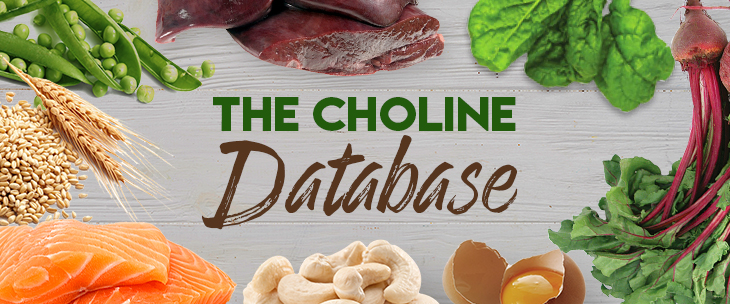
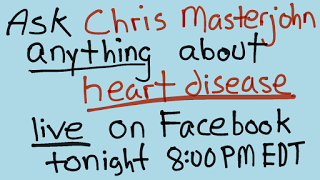
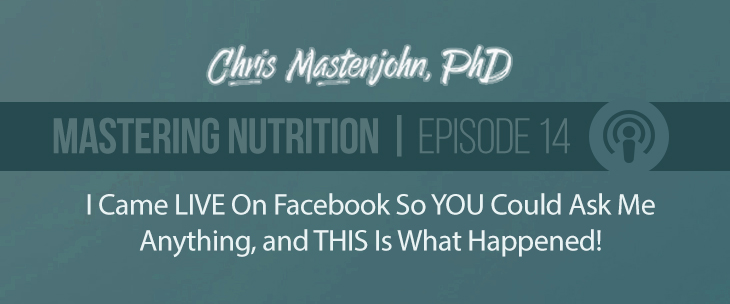
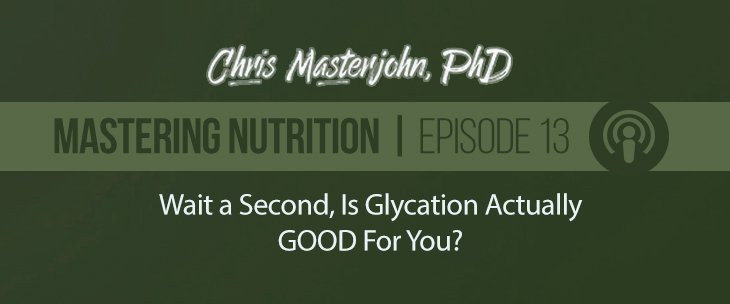
It is really disappointing to see that there are no responses to the questions asked in Comments as they could help other people who have the same experience ….
While Chris Masterjohn advocates for phosphatidycholine as the best source of choline Nootropedia dismisses it totally as a good source of choline – Comment please Chris. https://www.nootropedia.com/phosphatidylcholine/
Curious to know what the choline equivalent would be for something like this micellized PC? It seems this would be super charged choline. So one egg yolk would be equal what portion of this liquid? Thanks. https://www.emersonecologics.com/products/detail/phosphatidylcholine–lecithin-/micellized-pc-liposomal/12315/QSSPYC01
Phosphatydlcholine is contraindicated with cancer. My integrative doc doesn’t want me to take any form of choline because I have cancer. Yet my choline genetic report shows I need lots of choline. I already have NAFL. What do I do?
I’ve searched a bit for the amount of choline in lecithin just to be sure I don’t take too much or too little. Most sites (reliable? I have no idea but there was a certain consistency) say 240 mg / Tbsp. This would be at odd’s with Chris’s saying that 1 tbsp of lecithin Is an egg yolk equivalent since an egg yolk has, per the database, approx 130 mg. To make it even more confusing I have seen in various websites that an egg yolk has 240 mg??? Can anyone clear this up?
10 Grams of lecithin has 2,500mg of Phosphatidylcholine, (PC). PC is approximately 13.7% choline. So about 342MG of choline per 10G of lecithin. Most say an egg yolk has about 150MG of choline. So 10G of lecithin would approximate 2 egg yolks.
However, as I understand it most of the choline in eggs is in the form of PC, in which case the formulas most have been using are wrong!
Can anyone offer advice on how to deal with Insomnia from taking Betaine HCL for low stomach acid? I have Glycine but it’s excitatory as well (racing/pounding heart, anxiety), I do add potassium but it’s a constant see saw with minerals. Switched to ACV and Lemon water for 10 yrs but started causing issues (esp. with teeth) and high histamine. Of course dealing with underlying issues from parasite infection to Lyme to hypothryoid (T3 but still symptoims remain), and all that comes with that… Any direction welcome.
I’ve seen Trudy Scott address how collagen (glycine source) can increase anxiety in some people (not me—glycine calms me). I feel like Trudy Scott would be a good source for you. For thyroid, I read Dr. Westin Childs, and Izabella Wentz pharmD.
I found this product very helpful: https://microbiomelabs.com/home/products/megaguard/
This whole concept has been a huge part of me getting my LIFE BACK!!! This whole Masterjohn Methylation protocol–the glycine was the first discovery (It literally calmed my rages). THANK YOU CHRIS! You are one of my true heroes and I will be talking about you even when I’m old old. I was having my babies when you were in college and started writing. Found you because of WAPF. Now my babies are 15 and 13 years old. I’m so grateful to you and I try to keep up with the class. <3
Very helpful! Thank you! I have choline experience to share but also a couple of questions about this page.
1. Could you do a text addition on this page to show the equivalent number of beef liver in capsules to the 40g of fresh liver? beef kidney capsules?
2. Is taking Betaine HCL to BOTH improve protein digestion (the HCL) and TMG for methylation going to replace taking a separate Betaine/TMG supplement?
I started taking Seeking Health Optimal PC in Sept 2016. It was an integrative M.D. who told me to use it in therapeutic dose, for memory problems (I was 42 years old), but we didn't really discuss it much and then by the time I would have gone back to her and really asked her some questions about it, I moved away and didn't see her any more. But, it worked–after 4 months of high doses (I took 2 tsp. per day of the liquid/gel form, I noticed that my memory was getting much better. I've continued at maintenance doses since then, using capsules now, and my memory is about as good as ever. I've also made other improvements and lots of supplementation to figure out health problems, so that skews it. For example, AIP diet reduced swelling in my knee I'd had for 3 years, and reduced PMD mood hugely. I came back to your site many times, and glad I did because now I know I don't want to switch to Alpha-GP; I want to use the PC because I have Hashimoto's and my new doc mentioned fatty liver (and I don't drink alcohol). So, I'm going to move forward with this plan:
1. Take Betaine HCL to the amount that doesn't give me heartburn.
2. Take beef liver in capsules – 6 per day.
3. Take Beef kidneys in capsules (these also contain DAO enzyme, one hopes)
4. Put beet powder in my smoothies, convenient-consistent.
5. eat 2 egg yolks in smoothies also, but not more than 2 per meal.
6. Add back pressure-cooked Quinoa.
7. Keep taking occasional opportunities to eat fish roe, beet juice, beets.
8. Keep taking 1 capsule of phosphatidylcholine – possibly not taking it, to save money, on the days that I actually eat the egg yolks. (I can put them in my pill sorter, but easily pluck them out because of the dark brown color.)
9. Try to eat more liver(wurst) (with mustard), and if I do, I'll pluck those liver capsules out of my pill sorter.
10. Keep eating grass fed beef, bacon, and canned fish.
11. If I ever make it to Iceland, I'll try the seal. If it was sustainably caught.
I am an ApoE 4/4. Much to my dismay I rarely eaten yokes. Also I take Acetyl L Carnitine (500 mg), Citicholine(250mg) and TMG(1000mg to lower homocysteine). I also eat 3oz- wild small fish, grass fed pasture raised lean cuts beef, chicken, pork or lamb every other day. My TMAO is lowering (Aug 45 to Dec 31. From Jan to Aug I protein was seafood only. And then stopped Acetyl carnitine and Choline 6 Weeks before blood draw in Dec. My goal is to get homocysteine , TMAO, oxLdl, sdLdL, APoB back to optimal levels. I have been on Dr Bredesen’s supplement protocol for2 1/2 years . Dr Gundry suggested a very restricted ApoE4/4 which I did from Aug to Dec. , eliminating all dairy, all coconut fats, , all high fat meats, and poultry, reducing cruciferous vegetables, all lectins, all grains, only occasional residual carbs (artichoke, sweet potatoes). Energy was very low and I feel certain I couldn’t sustain it for years. My weight dropped to 108. Since then I added more protein in small amounts.(pressure cooked beans, 4 oz protein instead of 3, 1 oz of A-2 casein cheese or yoghurt 2 to 3 times a week, 72 hour sourdough bread slice 2 times per week) I feel much better and have more energy for workout and put back on some muscle weight. ShouldI continue citicholine andAcetyl LCarnitine and at what mg?
Pam,
Did you lower your intake of cruciferous vegetables for its potential impact on TMAO levels or for some other reason?
Thx for sharing your story and glad you found a diet that makes you feel better. No sense optimizing for the long term if we are miserable in the present
Yes lowered cruciferous to lower TMAO
I’ve suspected that my lifelong love of eggs came from somewhere… Looks like I need more choline than average. I’ve probably averaged 2.5 eggs daily throughout life (and yes, my blood lipids and other CVD markers are excellent), so I guess that’s a good starts.
I’m missing two types of food in the database that are eaten very frequently in my part of the world (Sweden): herring and fish roe. There’s a very popular “caviar” spread that even kids like, and fish roe is often served in sauces, to garnish eggs and hors d’oeuvres etc. Herring is very popular, especially for all the major holidays, along with salmon.
Liver spreads, for sandwiches, are also hugely popular in Sweden, btw. I guess I should embrace my national cuisine even more than I have thus far. I’m intrigued by the idea that there might be a link between a genotype like mine and traditionally choline rich foods.
You can get phosphatidyl choline as granules rather than capsules. It’s easy to mix into stuff like salad dressings.
Hi,
Can you please let us know which is the best form of choline for pregnant women?
I’m feeling very lost. My 23 and Me and Stratgene results indicate that I need a lot of extra choline (MTHFD and MTHFR mutations). And I’m trying to conceive. However, my homocysteine is bizarrely low (3!). TMG seems to lower homocysteine so it seems like I should avoid that. Yet phosphatidylcholine is only 15% choline. I can’t really get my full choline intake from foods because I’m vegetarian. What supplement(s) should I take to increase choline? Thank you!
Sorry to be so late on this comment but I just came across all of this. I’m in a somewhat similar situation. Overwhelmed newbie with MTHFR + others that Masterjohn’s Choline Calculator shows I need 8 egg equivalents a day. My homocysteine is 12.7 before starting all of this. I am newly pescetarian (long term plant based) trying to limit my fish to once per week. My current plan to get the extra choline & betaine is to try:
1. 8 tbsp wheat germ = 2 eggs
2. 4 tbsp sunflower lecithin granules = 4 eggs
3. 1/3 cup dry Quinoa = 2.7 eggs
I’ll put #1 & $2 in my green smoothie and try to do #3 as often as I can. Hoping the other plants I eat (and the once a week salmon) will fill in the gaps.
Hope you found a way to make this work for you.
It seems some of the richest choline foods are not mentioned in this database.
From nutritiondata.com (100 gram):
Beef brain, cooked: 491 mg (https://nutritiondata.self.com/facts/beef-products/3463/2)
Beef kidneys, cooked: 513 mg https://nutritiondata.self.com/facts/beef-products/3467/2
(for comparison beef liver, cooked, has 426 mg: https://nutritiondata.self.com/facts/beef-products/3469/2)
Caviar black and red: 491 mg (https://nutritiondata.self.com/facts/finfish-and-shellfish-products/4038/2)
Roe (mixed species), raw: 335 mg (https://nutritiondata.self.com/facts/finfish-and-shellfish-products/4098/2
When I found out I am extremely sensitive to eggs and stopped eating them I started feel worse! I always had a suspicion it was the choline! Looks like I was right. After doing your choline calculator looks like I need a lot!!! lol thank you so much for all you do and are doing
Is there a benefit to using liquid sunflower lecithin than powder?
Given I usually eat salads with dinner, I find it mixes into salad dressings easily. Emulsifies and thickens them up also.
Even though I’ve known about choline deficiency and fatty liver, I still developed one when I stopped eating eggs for a few months.
Now I’m having two eggs daily with a tablespoon of lecithin.
My anxiety is low now, sleep is excellent, no more purpura from blood clotting problems, etc. Cognitive function is much better.
Since it appears that I have a need for extra choline, I’m more than happy to continue this regimen.
I am surprised you didn’t mention CDP choline? What is your opinion on the option?
I’m curious about this too. I heard Dr. Shaw discuss CDP as a possible way to reduce infectivity of C19 by way of reducing PLA2. Apparently CDP choline behaves differently than other forms of choline (which can increase arachidonic acid and inflammation).
1: Is the phosphatidylcholine in sunflower lecithin Omega-6 phosphatidylcholine? (as opposed to Omega-3 phosphatidyl choline in salmon roe).
2: Would it be bad to consume too much Omega-6 phosphatidylcholine?
I think there may be an error in the data base. This is indicated by in the list of foods it showing a raw egg yolk to being equivalent to 5 egg yolks.
It’s not an error. It means that the yolk is 20 grams. So 100 grams of egg yolk would supply 5 egg yolk equivalents
This doesn’t help me compare e.g. liver to sweetbreads to heart. All organs are together w the rest of the meat. I might be interested to see how much choline is in raw goat cheese vs raw sheep or cow cheese. I don’t think this will do that, either. But it was fun looking.
My nutritionist recommends only Body Bio brand of Phophatidylcholine because it has a different ratio of fats. She suggested it to prevent the development of AMD but 6 months after starting it, I suddenly no longer needed to visit the periodontist. My dentist is delighted with my improvement and has spaced out my cleanings from 4 to 3 per year. And eye tests on a home device show improvement in my vision as well. This supplement is expensive, but I think worth it for my health. Thanks for all your research!
Hi Chris,
Whenever I take alpha-GPC at a 600 mg dose, a few hours after I feel irritatable, depressed, and have a generally bad mood.
Do you think this may have to do with methylation or diminished acetylcholine signaling after as it is cleared from the body?
Thanks,
Ian
Thought I’d give it a spin to see if one of my favorite keto snacks, liverwurst, had any choline. No entry for liverwurst. Too bad.